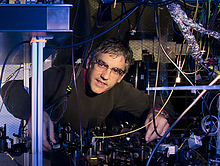 A noted physicist at the forefront of the university’s research efforts in quantum science was recently named a Distinguished University Professor.
A noted physicist at the forefront of the university’s research efforts in quantum science was recently named a Distinguished University Professor.
Christopher Monroe, the Bice Zorn professor of physics and a Fellow in the Joint Center for Quantum Information and Computer Science (QuICS), was among five faculty members selected for this honor in 2015. Fewer than 60 active professors hold the title, considered the most prominent internal academic distinction on campus.
Monroe says he is honored the university selected him for this title and credits his accomplishment to the colleagues he is able to work with here.
“This reflects the incredibly high level of students and postdoctoral researchers that I have been fortunate to work with,” he says, “and also the unique coordination of our college departments and the university as a whole to support the biggest quantum science enterprise in the world.”
The support of QuICS—one of 16 centers and labs in the University of Maryland Institute for Advanced Computer Studies—the Joint Quantum Institute and the physics department, as well as the students and faculty these units bring in, have allowed his research “to flourish,” he says.
Distinguished University Professors are chosen through a rigorous selection process that can take years. First, they are nominated by fellow faculty, then a committee of other professors considers the nominations. After an external group of international researchers gives their recommendations, the university president makes the final choice.
Recognition with this title shows you are at the top of your profession, Juan Uriagereka, associate provost for faculty affairs, says. He noted that Monroe’s selection was especially notable as he is still in the middle of his career, and most professors are recognized toward the end of their tenure.
“He is doing foundational research with quantum computation,” Uriagereka says. “The field couldn’t be more current or more relevant. To make concrete progress in this field is a big deal, and he is making that progress.”
—Story by Joe Zimmermann